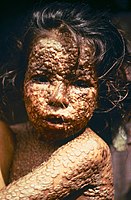
Photo from wikipedia
Bacterial pneumonia is one of the most important causes of mortality in the United States. The bacteria Klebsiella pneumoniae (KP) accounts for a significant proportion of community and hospital‐acquired infections.… Click to show full abstract
Bacterial pneumonia is one of the most important causes of mortality in the United States. The bacteria Klebsiella pneumoniae (KP) accounts for a significant proportion of community and hospital‐acquired infections. Here, we determine that the holy basil (Ocimum sanctum) extract improves cell viability and dampens the proinflammatory cytokine response in an in vitro model of pneumonia. For this, A549, a human alveolar basal epithelial cell line, was subjected to a lethal KP model following a 24‐hr pretreatment with basil extract. Bacteremia, cell viability, apoptosis, MTT assay, phagocytic capacity, cytokines, and Khe gene expression were assessed in these cells following pneumonia. Cell morphology analysis showed that holy basil protected A549 cells from KP infection–mediated effects by inhibiting cell death due to apoptosis. Additionally, in the presence of basil, A549 cells demonstrated significantly higher bactericidal capacity and phagocytosis. Administration of holy basil led to reduced expression of hypoxia‐inducible factor‐1/2a, nuclear factor kappa B, and Khe in the KP‐infected cells while increasing interferon (IFN)‐γ expression. Our results suggest that basil significantly reduced cell death in the setting of KP infection, likely via attenuation of cytokine and IFN‐γ mediated signaling pathways. Holy basil is a promising therapeutic agent for managing and treating bacterial pneumonia based on its potency.
Journal Title: Phytotherapy Research
Year Published: 2022
Link to full text (if available)
Share on Social Media: Sign Up to like & get
recommendations!